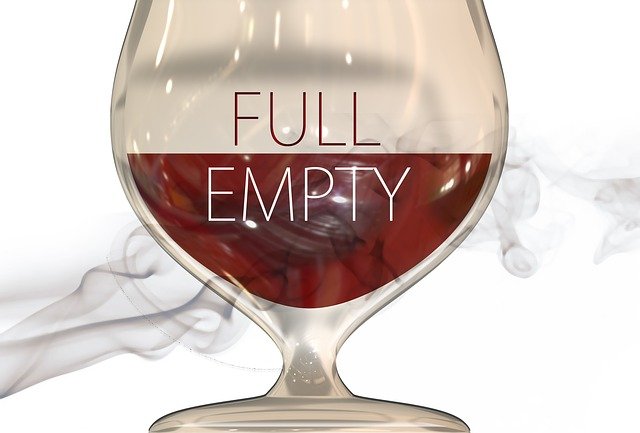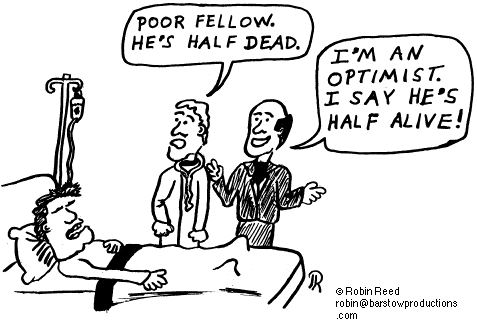Is the glass half full, or half empty? That is a tired old argument about characterizing someone in a negative light as a pessimist. As if recognizing the glass as full or empty means you are a positive or negative person.

Source
All the positivity-hype in recent decades, from the books, blogs and seminars for self-improvement, tries to get people to think that whatever they want to happen can happen if they believe it's possible. And sure, optimizing your mindset to motivate you to produce the results you want in life is a good way to get what you want. You can even make yourself feel good just by thinking optimistically about the potential outcomes in your future. Whether it happens or not, you can still generate positive states of well-being.
Pessimism gets a bad reputation overall. Certainly, people who are pessimistic all the time are the reason that pessimistic thinking is looked at as a negative modality in life. But pessimism isn't only about negative thinking. You can have a realistic appraisal about future outcomes that aren't all sunshine and rainbows through positive-only thinking. Having a concern about negative outcomes isn't a bad thing.
A defensive pessimist is a type of pessimist that can use negative thinking to reach goals in life. Contrary to what many people think, pessimism can help people succeed and get unexpected rewards. This is a specific type of thinking, not the main type of pessimism of blaming ourselves for negative outcomes in our lives, which certainly doesn't have the same potential for us to succeed as we erroneously find fault with ourselves even when there is none.
Some people have anxiety about future expectations. Defensive pessimism allows people to pursue a goal, rather than run the opposite direction. By setting low expectations of an outcome, it doesn't mean you don't have to pursue a certain plan. Looking at all the ways something can go wrong sets up a worst-case scenario for an outcome in reality. This can lead to anticipating and planning our way around such outcomes to make sure they don't actually happen.
For example, expecting a job to be hard to get hired for, and that you won't get hired, can lead you to practice more for an interview and actually get the job. This would also result in an unexpected reward, i.e. of getting the job.
If a defensive pessimist is put into a good mood, they can often perform poorly. But if they remain in a bad mood where they imagine negative outcomes, they often perform better by harnessing the threat potential to motivate themselves to do better.
Pessimism in general can also help in terms of having expectations and hope for an outcome. Positive thinking or optimism can lead us to have higher expectations and hope. If an outcome doesn't meet our expectations or hopes we have, then we are hit harder and experience greater disappointment, negative mood and a decrease in well-being. Pessimism can thus reward us unexpectedly, rather than being overly optimistic and positive and not getting the reward we expect.

Source
Defensive pessimism also has health benefits, whereby preventive actions are undertaken in order to avoid negative health, such as anticipating the chances of getting sick during a flu outbreak where they wash their hands more frequently and are more careful about putting their fingers to their mouth, etc.
The coping mechanism of defensive pessimists is what sets them apart from the standard negative thinking of regular pessimists. They are more effective at preparing for situations and don't avoid them altogether. The negative expectations motivate defensive pessimists to act and be more prepared in order to control the future outcomes in their lives, as opposed to avoiding it like regular pessimists might do, or expecting things to magically work out in their favor like some optimists do.
Other people might not like hearing about a pessimistic outlook, but it can be beneficial by being more realistic about potential negative outcomes and maximizing our success by planning to avoid them. Having realistic outcomes involved seeing the negative potential, not simply being blind-sided by positivity.
Thank you for your time and attention. Peace.
References:
- Effects of optimism on psychological and physical well-being: Theoretical overview and empirical update
- The positive psychology of negative thinking
- Pessimistic Explanatory Style Is a Risk Factor for Physical Illness:
- Defensive Pessimism, Anxiety, and the Complexity of Evaluating Self-Regulation
- The effects of negative reflection for defensive pessimists: Dissipation or harnessing of threat?
- The Costs of Optimism and the Benefits of Pessimism
- Constant vigilance: Heritage values and defensive pessimism in coping with severe acute respiratory syndrome in Singapore
- Who Looks Forward to Better Health? Personality Factors and Future Self-Rated Health in the Context of Chronic Illness
- Distinguishing defensive pessimism from depression: Negative expectations and positive coping mechanisms
- The surprising benefits of being a pessimist
If you appreciate and value the content, please consider: Upvoting, Sharing or Reblogging below.
 me for more content to come!
me for more content to come!
My goal is to share knowledge, truth and moral understanding in order to help change the world for the better. If you appreciate and value what I do, please consider supporting me as a Steem Witness by voting for me at the bottom of the Witness page; or just click on the upvote button if I am in the top 50.

True. I don’t think anyone should go too far one way or the other. It’s easy to get caught up in it like that, but focusing on staying more level headed is a solid approach. Not too high, not too low. Lol :-)
Yes, often there are dual sides to much, a good and bad aspect to much, which can be applied in different ways depending on the context, circumstance or situations of life.
Enjoyed reading this piece as it got me thinking... I appreciate that you brought to light the aspects of defensive pessimism, I could use a little dose of that now and again. It’s great that you’ve unpacked these midunderstood concepts that control much of our lives as it allows for a more conscious sculpting of the life we're choosing. Thanks for sharing
You're welcome, I'm glad you gained value from the knowledge here. Take care. Peace.
Different minds, different perceptions.
well, sometimes motivating our self can really benefit, because it gives us the energy to do some task,
but sometimes we need to think negative to correct some negative thing,
So different thinkings different situations.
Exactly, different thinking for different situations :)
Yeah ;)
Well said!
I'm a pessimist with optimistic goals. Looking for ways to avert the pitfalls towards my goals because life isn't a bed of roses and there's plenty of people who will throw a monkey wrench into any pursuit, knowingly and unknowingly.
I'm probably of a similar mindset. I say that I'm a realist, idealist and optimist. The realist part looks at the negatives in reality and accepts them in order to find ideals and optimize living that way ;)
Indeed a pessimist can reach goals as can an optimist. A balance is good. Wisdom an experience teaches you how to view the cup. Thinking things through helps too. LOL Thanks @krnel.
a rich person is going to see the glass half empty, because they are used to have someone hired to keep the glass filled constantly.
I am going to see it half full, even if I am not optimistic. Because if I haven't eaten today, and I am starting to think... well ok... I can't eat today, but it is ok, my optimistic side kicks in and says, maybe we don't need to eat every single day and can be a good thing. But hey! Look at that glass almost full !
So... It depends on the observer. Like in the quantum world. What truly happens is that the glass is both half full and and half empty at the same time ;)
The glass is both half full and half empty, either way is describing how it is ;)
wow, writing very good... i very like this. if you have time please read and sugestion my posting, because i'm newbie
Put the glass down!
xD
Pessimists are never disappointed. I don’t like disappointment, it makes life easier to not have grand positive thoughts of possibility. Of course there’s always the danger of not trying and never knowing what might have been...